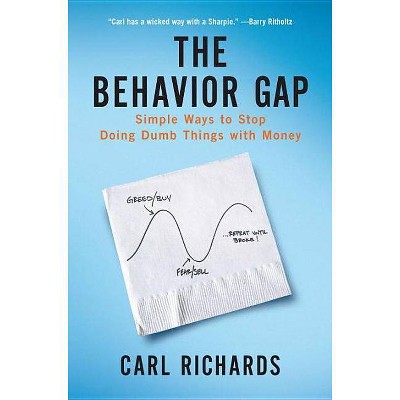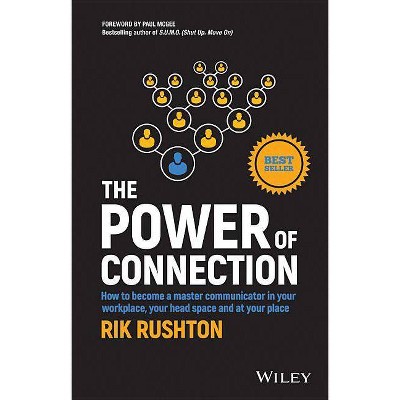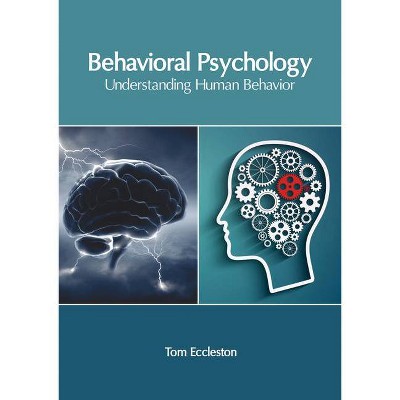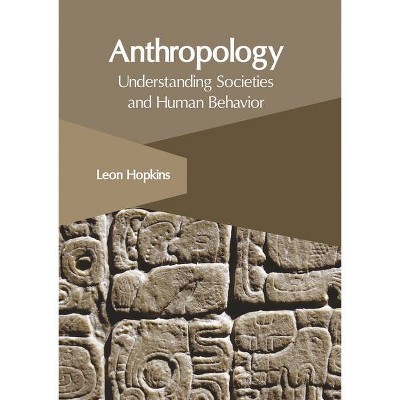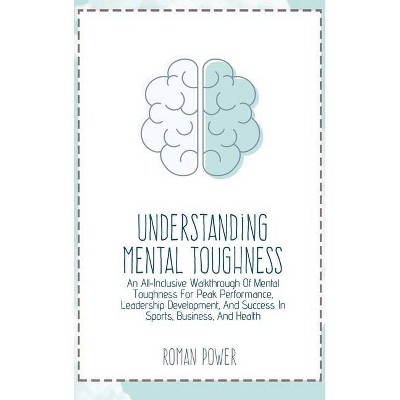Understanding the Biological Basis of Behavior - by Rik Carl D'Amato & Andrew S Davis & Elizabeth M Power & Eleazar Cruz Eusebio (Hardcover)
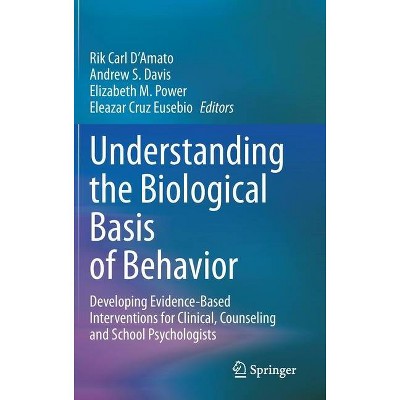
Similar Products
Products of same category from the store
AllProduct info
<p/><br></br><p><b> Book Synopsis </b></p></br></br><p>This book is an introduction to the biological basis of behavior, broadly defined, with practical applications for higher education programs that focus on advances in neuroscience. It has a special focus on training practitioners based on American Psychological Association (APA) health service psychology guidelines. It reviews and digests information for clinical, counseling, and school psychologists serving clients of all ages in a variety of settings, such as schools, hospitals, and clinics. Content for all developmental stages, including birth to geriatric practices are highlighted. </p><p>Some unique features of this book include: </p><p></p><ul><li>The integration of neuropsychological and theoretical foundations for clinical practice.</li><li>Comprehensive consideration of projective, objective, and interviewing measures.</li><li>Recent research in neuroimaging as it relates to clinical practice.</li><li>Psychopharmacology and its effect within the neurosciences.</li><li>Assessment for intervention in clinical, counseling, school, and neuropsychology.</li><li>The use of research to guide neuropsychologically-based clinical practice.</li><li>Eastern and western approaches to integration and case conceptualization.</li><li>Interventions driven by brain-based scientific understanding.</li><li>A variety of neuropsychological cases and report styles to improve practice</li></ul><p></p><p>The enduring contribution of psychology into modern times will remain contingent on practitioners' commitment to ethically-based, empirically-focused, evidence-based practice; continuing education; and scientific discovery. This book will help health service psychologists and counselors to meet the needs of an increasingly diverse population by providing cutting-edge, evidence-based, ecologically valid neuropsychological interventions currently lacking within the field. Cultural considerations are provided within each chapter, which is especially important given societal inequity that continues to persist within our world. Implications for the COVID-19 pandemic are also discussed in light of neuroscientific advances in medicine.</p><p></p><br><p></p><p> </p><p> </p><p/><br></br><p><b> From the Back Cover </b></p></br></br><p>This book is an introduction to the biological basis of behavior, broadly defined, with practical applications for higher education programs that focus on advances in neuroscience. It has a special focus on training practitioners based on American Psychological Association (APA) health service psychology guidelines. It reviews and digests information for clinical, counseling, and school psychologists serving clients of all ages in a variety of settings, such as schools, hospitals, and clinics. Content for all developmental stages, including birth to geriatric practices are highlighted.</p><p>Some unique features of this book include: </p><p></p><ul><li>The integration of neuropsychological and theoretical foundations for clinical practice.</li><li>Comprehensive consideration of projective, objective, and interviewing measures.</li><li>Recent research in neuroimaging as it relates to clinical practice.</li><li>Psychopharmacology and its effect within the neurosciences.</li><li>Assessment for intervention in clinical, counseling, school, and neuropsychology.</li><li>The use of research to guide neuropsychologically-based clinical practice.</li><li>Eastern and western approaches to integration and case conceptualization.</li><li>Interventions driven by brain-based scientific understanding.</li><li>A variety of neuropsychological cases and report styles to improve practice</li></ul><p></p><p>The enduring contribution of psychology into modern times will remain contingent on practitioners' commitment to ethically-based, empirically-focused, evidence-based practice; continuing education; and scientific discovery. This book will help health service psychologists and counselors to meet the needs of an increasingly diverse population by providing cutting-edge, evidence-based, ecologically valid neuropsychological interventions currently lacking within the field. Cultural considerations are provided within each chapter, which is especially important given societal inequity that continues to persist within our world. Implications for the COVID-19 pandemic are also discussed in light of neuroscientific advances in medicine.</p><p/><br></br><p><b> About the Author </b></p></br></br><p></p><p>Rik Carl D'Amato, PhD, is a Distinguished Research Professor of School Psychology and Clinical Neuropsychology at The Chicago School of Professional Psychology (TCS), in the APA-accredited Psy.D. School Psychology program. Before joining the TCS faculty, he served as Director of the Center for Teaching and Learning Enhancement and Head of the Department of Psychology at the University of Macau, Macao SAR, China. He also serves as a school psychologist for PresenceLearning, one of the largest telehealth providers in the US. He is an award- winning teacher, with having taught more than 400 courses. He is alsothe author of 11 books, 70 periodical publications, 70 book chapters, and has provided hundreds of presentations around the world during the last 35+ years. He also served as Founding Editor of the <i>International Journal of School & Educational Psychology </i>and as Editor-in-Chief of the APA Division 16 journal, <i>School Psychology</i>. A past Fulbright Scholar to Latvia, he is a Fellow of the APA and an elected member of SSSP.</p>Andrew Davis, PhD, is the Chair of the Department of Educational Psychology and a Professor of Psychology at Ball State University Neuropsychology Laboratory. He was the founding Editor-in-Chief of the Journal of Pediatric Neuropsychology. His research interests are primarily focused on applied aspects of clinical neuropsychology. This includes the neuropsychological functioning of neurologically and psychiatrically impaired individuals and psychometric issues in neuropsychological assessment. Dr. Davis is the editor of the Handbook of Pediatric Neuropsychology. Dr. Davis primarily teaches classes in neuropsychology, developmental psychopathology and cognitive assessment. Dr. Davis is a licensed psychologist and has provided clinical services and supervision in a variety of settings.<p></p><p></p><p>Elizabeth M. Power, EdD, is an assistant professor in school psychology at the College of Saint Rose in Albany, NY. Dr. Power earned her Education Specialistdegree in school psychology, and practiced for five years in public schools. Dr. Power completed herdoctorate in school psychology and clinical neuropsychologyat The Chicago School of Professional Psychology. She is an editorial board member of the <i>International Journal of School and Educational Psychology</i> and chaired the American Psychological Association School Psychology convention in 2020. In addition to her work as a professor, Dr. Power provides consultative and assessment services to nearby school districts.She also serves as Research Chair for the New York Association of School Psychologists. Dr. Power's research interests include neuropsychology, gender and inclusion, and the national shortage of school psychologists.</p><p>Eleazar Cruz Eusebio, Psy.D., NCSP is a school psychologist with Prince George's County Public Schools where he provides district-wide crisis intervention and supervision to graduate students using neuropsychologically informed approaches in assessment with children. After a decade in academia as an associate professor and department chair, Dr. Eusebio returned to the schools with a focus on working with diverse and underserved communities. His academic contributions in the areas of developmental psychopathology, emotional disorders, executive function, and neurodevelopmental approaches to assessment, intervention, and therapy have been readily translated for use in applied settings. Dr. Eusebio is a licensed psychology associate and has provided specialized clinical and school services to children and families in a variety of settings.</p><p></p><p></p>
Price History
Cheapest price in the interval: 102.99 on October 27, 2021
Most expensive price in the interval: 102.99 on November 8, 2021
Price Archive shows prices from various stores, lets you see history and find the cheapest. There is no actual sale on the website. For all support, inquiry and suggestion messagescommunication@pricearchive.us
